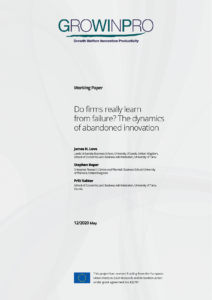Abandoned and failed innovations can be regarded as a part of the natural process of experimentation by firms, which can lead to important lessons being learned. Although the literature suggests some benefit from failure or abandoned innovation activities, prior studies using relatively large firm-level datasets to test the nature of this link are often unable to deal explicitly with the time dimension of learning. We contribute to the literature by showing the dynamic and causal nature of the linkage between abandoned innovation and subsequent innovation outcomes at firms. We demonstrate based on balanced panel data of Spanish manufacturing firms from 2008-2016 that innovation failure not only leads to more successful innovation, but that there is an explicit time dimension to this. We demonstrate that firms which have experienced ‘failure’ (as evidenced by abandoned innovation activities) in the past will have stronger positive effects of recent abandoned innovation activities on innovation output. This is a strong test of the ‘learning-from-failure’ hypothesis. In addition, we find evidence that in addition to enabling cumulative learning processes, abandoning innovation may also act as a dynamic corrective mechanism preventing firms carrying weaker innovation portfolios through from one period to the next.

